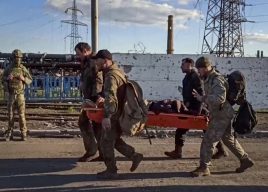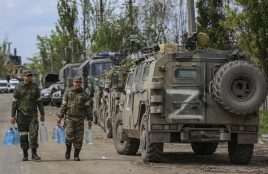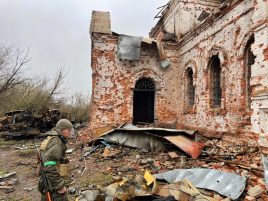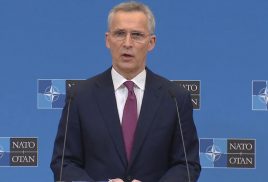
Ukrainian Azov Regiment fighters barricaded in the Azovstal steel plant in Mariupol have surrendered. The mass surrender, announced by Moscow, raises questions on the fate of the soldiers, whom Kyiv considers heroes but whom Russians claim to be neo-Nazi terrorists. Slightly less than 1,000 soldiers have been ”evacuated”, according to the Russian Defence Ministry. Approximately 50 critically wounded soldiers have been admitted to the hospital in Novoazovsk, in the pro-Russian separatist-held Donetsk oblast. There are believed to be soldiers remaining inside the compound, and negotiations are underway for their evacuation. After almost three months of war negotiations are deadlocked, with the Russians and Ukrainians shifting responsibility. At diplomatic level, Finland and Sweden reaffirmed their intention to join NATO, whose Secretary General Jens Stoltenberg forecasts Ukraine’s likely victory. Latest reports from the battlefield indicate that the Ukrainians have taken back Kharkiv and have reached the border with Russia. Meanwhile, the Russian offensive is raging in Donbas, whose Donetsk region has been heavily shelled; five civilians have been killed in Bakhmut, including a two-year-old. Ukraine’s General Staff said Russian forces were trying to take full control of Lyman and Severodonetsk, attacking from the north. Missiles were also fired on Dnipro and the coastal area, where Russian forces renewed attacks on the port city of Odesa from the sea. SIR interviewed Giorgio Cuzzelli, retired Brigadier General, professor of International Security at Rome’s LUMSA and at “L’Orientale” University in Naples, co-author, with Matteo Bressan, of the book Da Clausewitz a Putin: la guerra nel XXI secolo: Riflessioni sui conflitti nel mondo contemporaneo (Ledizioni).
 General, the latest news is that the Ukrainian Azov Regiment fighters barricaded in Mariupol’s Azovstal steel plant have surrendered: what could be their fate now that they are in Russian hands?
General, the latest news is that the Ukrainian Azov Regiment fighters barricaded in Mariupol’s Azovstal steel plant have surrendered: what could be their fate now that they are in Russian hands?
Pursuant to the Geneva Convention, because they are soldiers of an internationally recognised nation’s army and were captured wearing military insignia, these Azov Regiment soldiers should be considered legitimate servicemen and therefore treated according to international conventions. Therefore, if Russia and Ukraine have signed these international conventions, they are obliged to abide by them.
What does this imply?
That they must be treated as prisoners of war, meaning that they must receive medical assistance, be allowed to communicate with their families, not be subjected to mistreatment and torture, along with all the other provisions stipulated in the relevant conventions.
But this is only one side of the coin. In fact, we must not overlook the statements – which are uncalled for, to say the least – coming from the Russian side, advocating the shooting of prisoners because considered Nazis and terrorists.
Could it really go so far?
The Russians are rational interlocutors and they would never do such nonsense that would further jeopardise their standing at international level. However, just as in Europe and the United States there are people saying nonsense about Russia because of what it did in Ukraine, similarly in Russia there are people thinking and saying nonsense. Russia’s leadership is unlikely to damage its public image so terribly by harming these prisoners of war. And this regardless of whether the latter might be considered Nazis or political extremists by some. They are legitimate combatants belonging to regular army units embedded within the Ukrainian army. These are people who fought for their country, like it or not.
Could the fact that Russia has not formalised a state of war with Ukraine, but repeatedly said it was conducting a special military operation, be used to bypass international law on prisoners of war?
International law is largely based on praxis. In this specific case, even if a state of war has not been declared between the two nations, all laws of war principles apply by virtue of “praxis and necessity.” In fact, the Russians have accused the Ukrainians of exploiting the Red Cross symbol, or rather of using institutions bearing the Red Cross, an international symbol of neutrality, to house soldiers and military equipment. This is strictly forbidden. Apparently, the Russians, at least in words, are very keen about compliance to conventions. We would all like them to be equally rigorous when it comes to deeds.
 Speaking of the war, the latest reports indicate that the Ukrainians have taken back Kharkiv and have reached the border with Russia. , Finland and Sweden reaffirmed their intention to join NATO, whose Secretary General Jens Stoltenberg forecasts Ukraine’s likely victory. What is the situation on the ground?
Speaking of the war, the latest reports indicate that the Ukrainians have taken back Kharkiv and have reached the border with Russia. , Finland and Sweden reaffirmed their intention to join NATO, whose Secretary General Jens Stoltenberg forecasts Ukraine’s likely victory. What is the situation on the ground?
Conflicting news is arriving from the battlefield. We are facing the so-called ”fog of war” , a phrase that refers to the uncertainty in information regarding the intentions of the warring parties.
We have no clue as to the intentions of the Russians and the Ukrainians. However, if we look at the map and extend our gaze to these last three months of hostilities, we will notice that the war has taken a clear direction.
The Russian modus operandi has seemingly undergone a further development. At first, the Russian troops carried out their assault under the assumption that they would meet no resistance from the Ukrainian side. But faced with the unyielding opposition of the Ukrainian army, they redeployed their forces and attacked the southern part of the country in an attempt to create the notorious Crimean corridor. And they succeeded. Now they are focusing on the Donbas area in an attempt to capture it in its entirety. Their war efforts are focused there. Which is why they gave up the Kharkiv front.
Should the Russians conquer the entire Donbas region, do you think they could decide to sit at the negotiating table with the Ukrainians, who repeatedly said they would not give up an inch of territory?
Having gained what are now the minimum goals, namely the full occupation of the two provinces of Luhansk and Donetsk, with strategically defendable positions, I believe that Putin could eventually stop and negotiate.
Also seizing Odesa is among Putin’s goals…
Seizing Odessa and cutting off completely Ukraine’s access to the sea is an ambitious move. If Ukraine lost access to the sea, given the country’s relevance to global food systems, given its wheat production, the consequences would be unpredictable. It is legitimate to wonder whether Russia has sufficient forces to accomplish this. In my opinion at present it does not.
 How can Ukraine be persuaded to sit at the negotiating table instead?
How can Ukraine be persuaded to sit at the negotiating table instead?
In this case, there are two distinct conflict resolution options: coercive diplomacy and the negotiation option. Coercive diplomacy towards Russia aims at bringing the opponent to accept unwelcome decisions through a rational use of force, while at the same time making it clear that adhering will yield some gains without loosing too much face. In essence, the point is to make Putin realise that he has reached the limit of what he could aim for and that now it’s time to negotiate. This is the ultimate goal of the sanctions and of military aid to Ukraine.
In fact, the notion that Ukraine can win the war is hard to envisage. Convincing Ukraine to sit down at the negotiating table would require a negotiating option that is based on building mutual trust between the warring parties, through dialogue, in order to broker an agreement that brings some advantage to both.
At present, this option would appear non-existent, despite the mediation efforts being made by several parties. The alternative is a win-win agreement, i.e. a solution providing a mutually beneficial outcome that justifies a cessation of hostilities. For Russia this means the “reunification” of Crimea and the occupation of the two Russian-speaking provinces at the very least. For the Ukrainians it is harder, because it means making them digest a bitter pill, such as giving up Crimea once and for all, and losing additional territories. In return, they could be granted US security guarantees, rapprochement with European institutions, and the reconstruction of the country. Ultimately, the US could act as mediator. This mediation would grant Russia the equal status it aspires to. Thus, for the sake of a greater good, we should in this case come to terms with the devil. Yet it would mean that Ukraine would have to swallow a bitter pill. And I doubt that the time is ripe for such a choice either.
 What do you think of Sweden and Finland’s decision to join NATO? Is it a move dictated by the fear of an eventual Russian invasion as happened with Ukraine? The North Atlantic Alliance seems to have rediscovered a raison d’être at this stage…
What do you think of Sweden and Finland’s decision to join NATO? Is it a move dictated by the fear of an eventual Russian invasion as happened with Ukraine? The North Atlantic Alliance seems to have rediscovered a raison d’être at this stage…
I have no doubts that NATO has regained its raison d’être. But I would be cautious about its cohesion. And I would be equally cautious with regard to Europe. On the other hand, it is evident that Putin’s unexpected move sparked fears in all neighbouring countries, all of which are preoccupied by Russia’s renewed assertiveness. Sweden and Finland’s concerns are more than justified. Helsinki has a 1,500-kilometre border with the Russian Federation, which makes it hard to defend by a country with eight million inhabitants. Understandably, they have chosen to adhere to the only alliance system that can guarantee protection. The same goes for Sweden, which is renouncing its long-standing neutrality. The reason is that everyone is afraid of Russia, starting with those who were subjected to it under Communism and the Warsaw Pact. Those who have known the Russian Bear are afraid of it. Russia causes fears primarily because its system of values differs from the value system underpinning our democratic societies.
We talked about Russia, the US, the EU, NATO, but not about China. Is it the most notable absentee or the “Stone Guest” in this Russian-Ukrainian conflict?
It’s a guest waiting outside, trying to understand the turn of events and bracing for the West’s hand-over of Russia. This is a disaster for the West because its real competitor is China, not Russia. If the latter had been better dealt with, it might not have caused the situation we are facing today. I think that the United States is now coming to realise this. The US hardline policy, under Biden’s leadership, is not benefiting the relations with Europe, which is fighting a war against the Russians and bearing its economic and financial consequences. It remains to be seen to what extent Europeans will be willing to play this game in the name of democracy and peoples’ freedom. Finally, there remains the question of how convenient it is for the US to create a new enemy in Europe , i. e. Russia, when their main preoccupation is in the Pacific.


